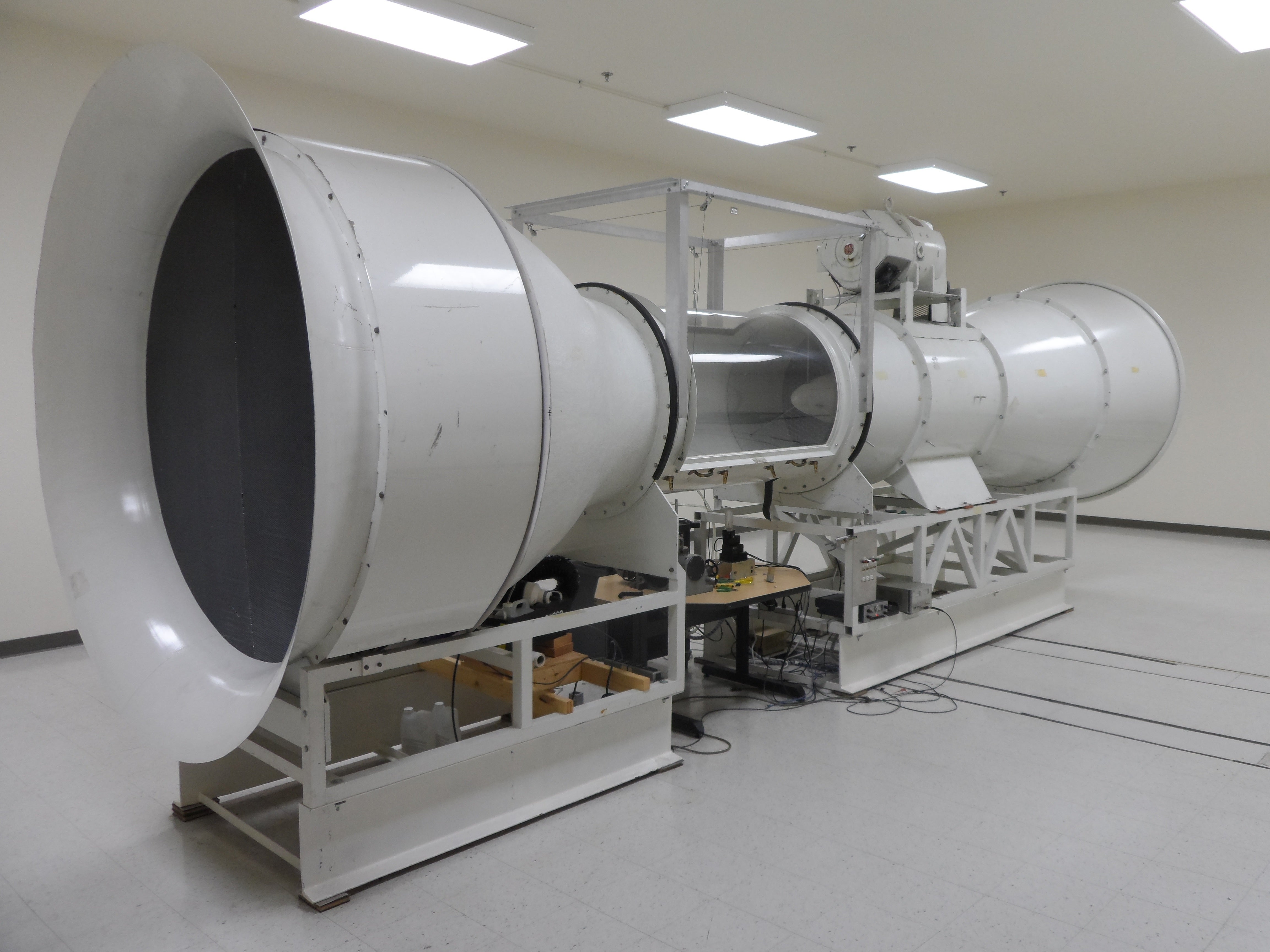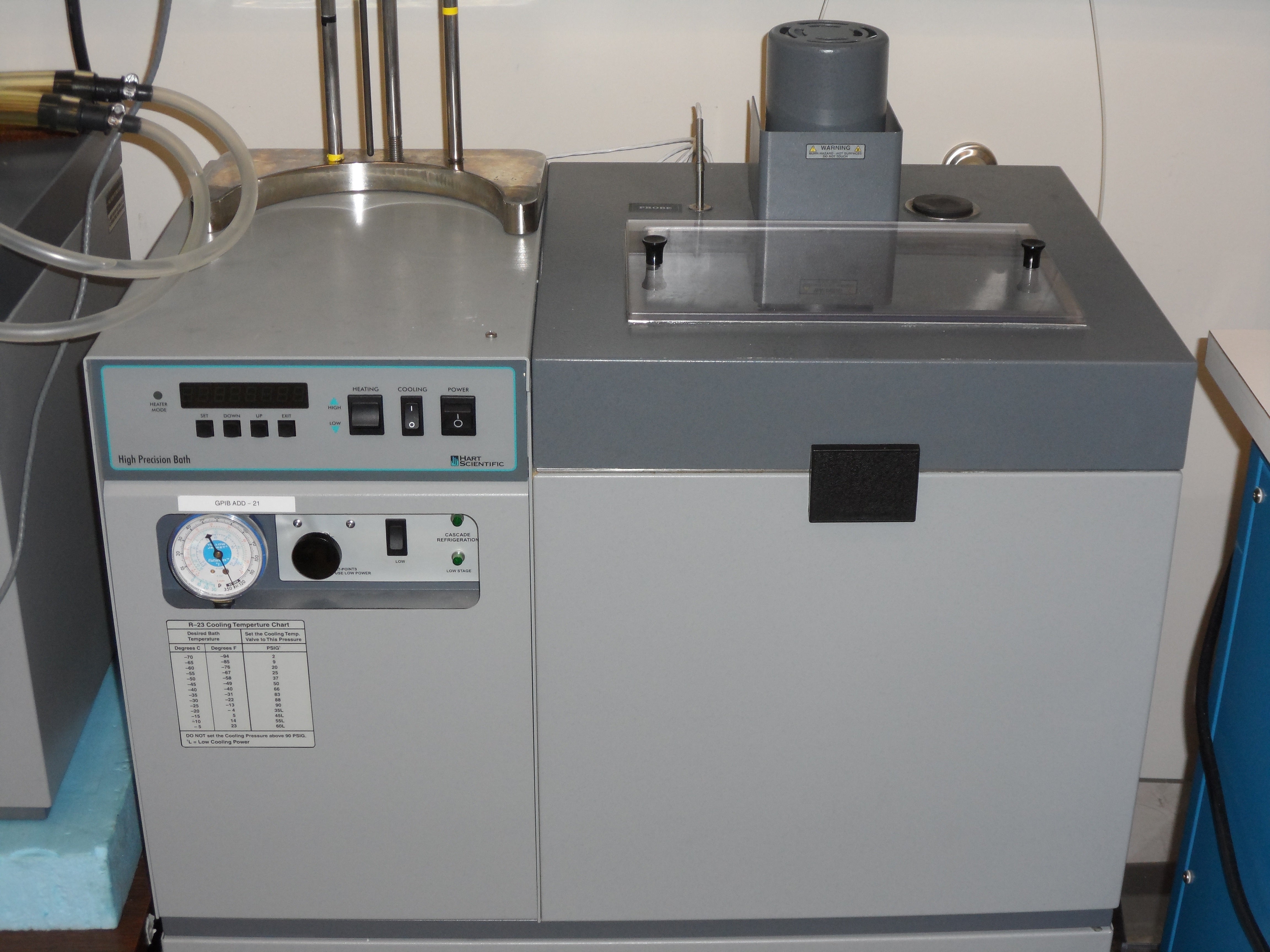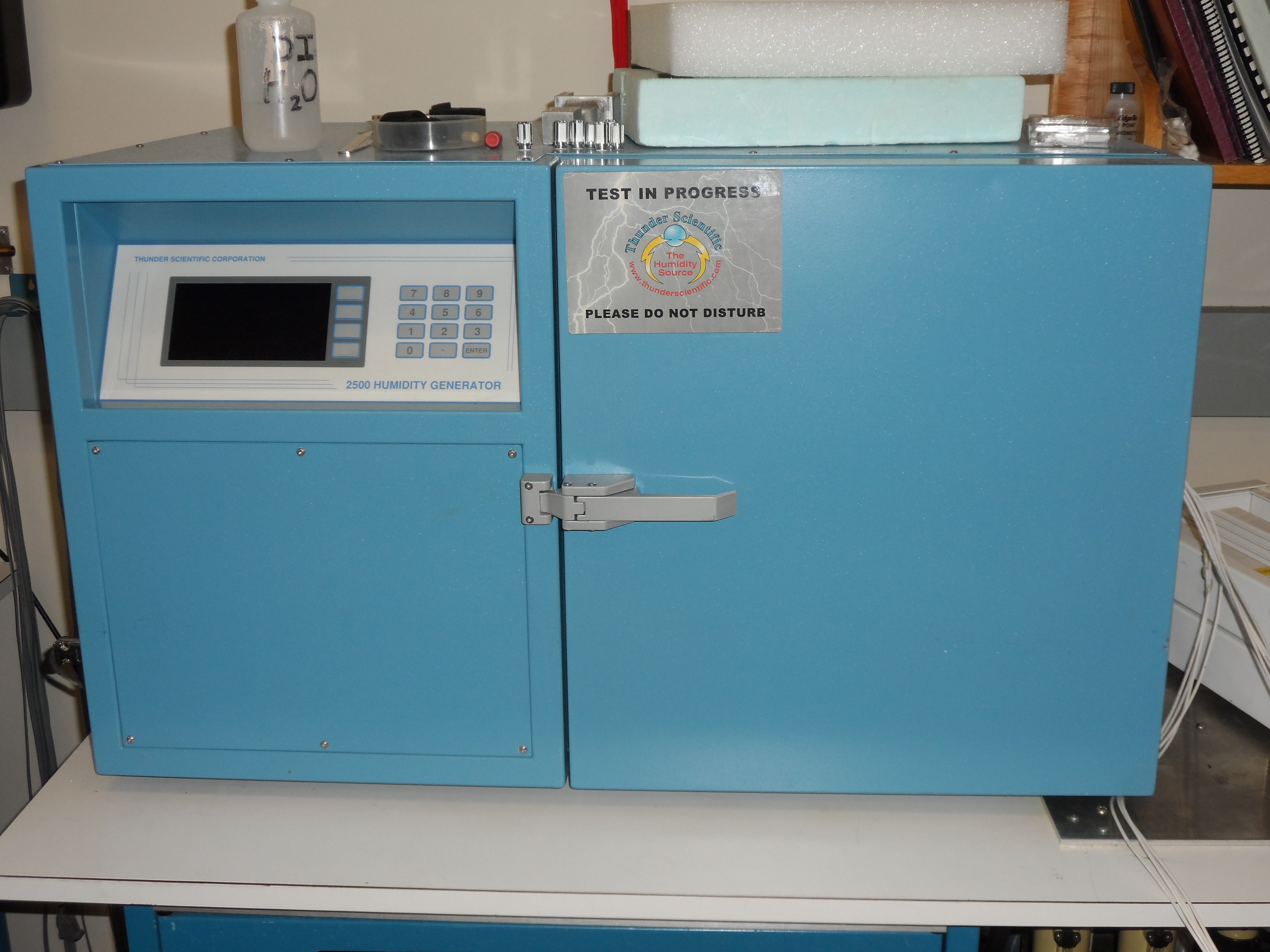Altitude/Temperature Environmental Chamber
The Thermotron Model FA-96-CH-5-5-RAC Altitude/Temperature chamber is the latest addition to the EOL calibration laboratory. The combination of altitude and temperature provides a simulation of real-life conditions. This will allow for testing of instrumentation on the ground, versus an aircraft, in a controlled environment. The chamber has an altitude range of sea level to 30,480 m (100,000 ft) and temperature range of -73°C to 177°C.
Specifications
| Temperature | |
| Range | -73°C to 177°C |
| Control | ± 1.1°C (after stabilization at the control sensor) |
| Rate of change with 400 lbs of aluminum billets and 1000 watt live load (at ambient pressure) |
23°C to -18°C - 45 minutes
23°C to -57°C - 160 minutes
23°C to 93.3°C - 30 minutes
23°C to 149°C - 65 minutes
|
| Altitude | |
| Range | sea level to 30480 m (100,000 ft) |
| Accuracy | ±0.02%FS |
| Control | |
| Transition rate |
site pressure to 15,240 m (50,000 ft) - 10 minutes
site pressure to 21,336 m (75,000 ft) - 20 minutes
site pressure to 30,480 m (100,000 ft) - 30 minutes
|
Wind Tunnel
The EOL wind tunnel was custom built for NCAR back in 1969/1970. It was specifically designed for testing of meteorological instrumentation. 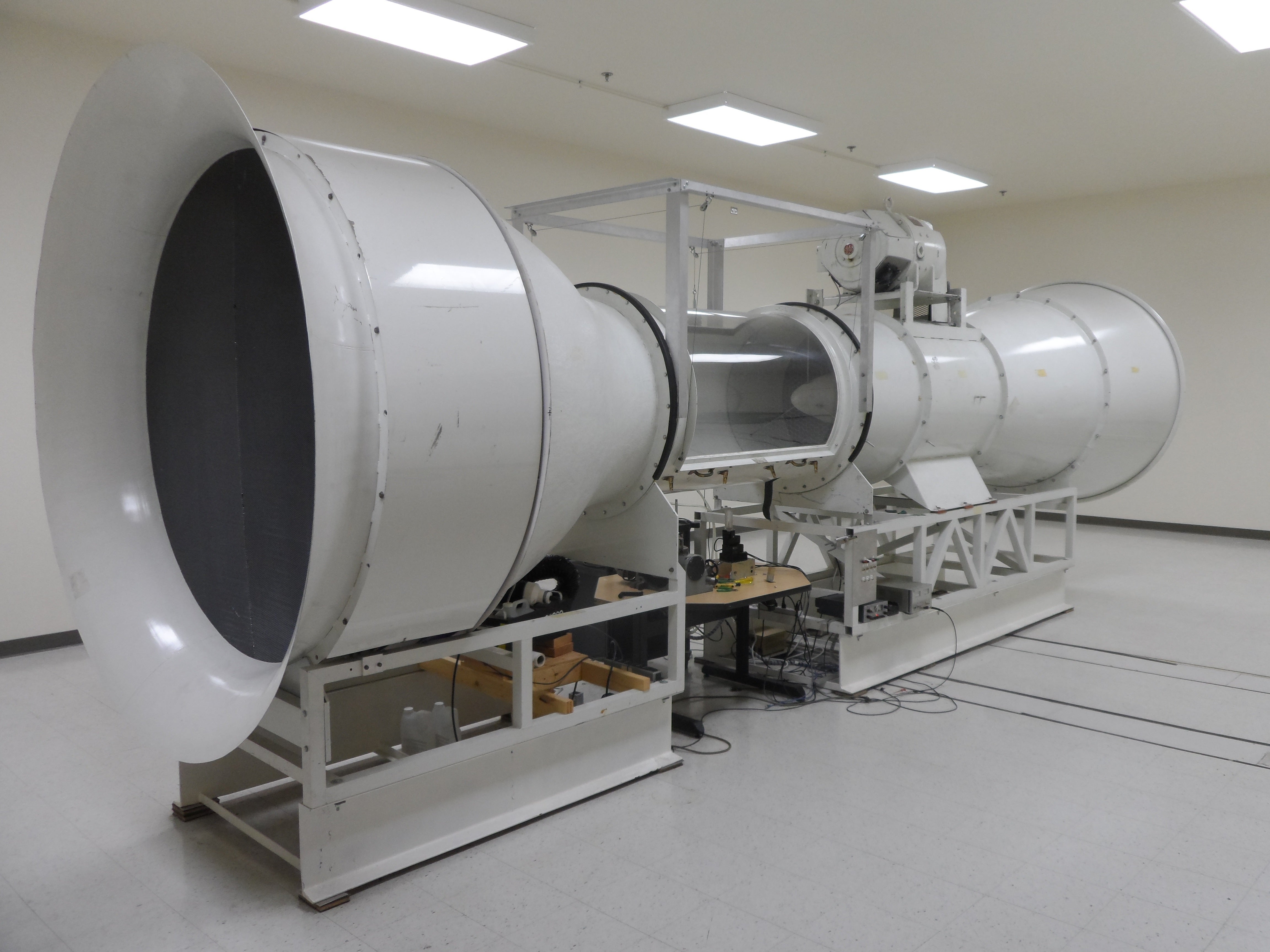 The tunnel provides a linear flow up to 25 m/s. The tunnel is an open loop tunnel located in a large room. The tunnel reference wind speed is obtained using a pitot-static tube connected to a differential pressure transducer. Ambient air pressure, temperature, and humidity are measured to compute air density needed to convert the differential pressure to wind speed. A Rosco Omega-XL Series XCI-1263 fog generator also is available for flow visualization.
The tunnel provides a linear flow up to 25 m/s. The tunnel is an open loop tunnel located in a large room. The tunnel reference wind speed is obtained using a pitot-static tube connected to a differential pressure transducer. Ambient air pressure, temperature, and humidity are measured to compute air density needed to convert the differential pressure to wind speed. A Rosco Omega-XL Series XCI-1263 fog generator also is available for flow visualization.
Specifications
| Tunnel size | 218 cm (D) x 732 cm (L) |
| Test section | 89 cm (D) x 152 cm (L) |
| Range | 0 m/s to 25 m/s |
| Accuracy | 0.1 m/s |
| Resolution | 0.01 m/s |
Deadweight Piston Gauge
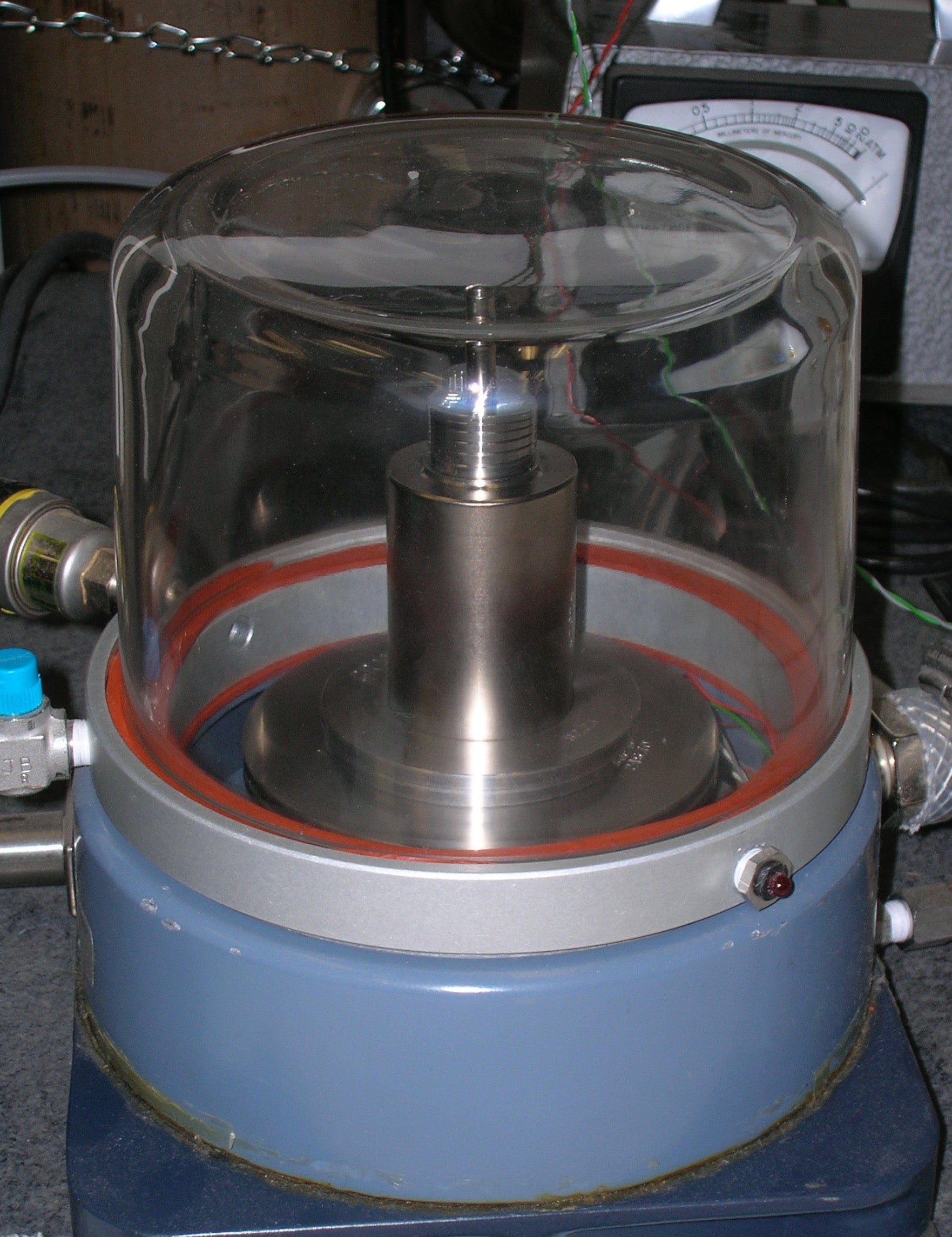
The deadweight piston gauge (Bell and Howell) is used is to measure pressure in terms of fundamental units - force and area. A piston is inserted into a close fitting cylinder.
Weights are placed on one end of the piston and are supported by fluid pressure applied to the other end. For absolute pressure measurements, the assembly is placed inside an evacuated bell jar. Pressure measurements take into account a number of parameters affecting the instrument and its environment. they include the uncertainty of the mass of the weights and the error in the effective area measurement of the cylinder, gravity measurement, air buoyancy, and temperature. The dead weight gauge is normally not used today due to the labor-intensive operation.
Specifications
| Accuracy | 0.05 mb |
Environmental Temperature Chamber
The environmental temperature chamber is a Thermotron model S-32. The chamber is normally used to expose instrumentation to a wide range of temperatures. The chamber can be run manually or programmed to go to selected temperature points with the ability to define the rate of change and soak times. The chamber can be used to calibrate instruments if a temperature reference probe is used.
Specifications
| Temperature range | -70°C to 180°C |
| Temperature control | +0.3°C |
| Temperature uniformity | +0.7°C |
| Cooling change rate | 55 mins (25°C to -65°C) |
| Heating change rate | 40 mins (25°C to 170°C) |
| Live load capacity | -54°C (400 watts) |
Pressure Controller/Calibrator
Pressure calibration is handled with a Ruska 7250i controller/calibrator. The system operates in an absolute pressure mode but can be reconfigured to a gauge mode. The pressure reference is a Quartz Bourdon tube sensor housed in a temperature controlled aluminum enclosure. The controller has the option to output the reference reading in a variety of standard pressure units. The instrument under test is normally interfaced to the controller via a Swagelok fitting or a flexible tube. If this is not possible the instrument under test can be put into a sealed container which is connected to the controller.
Specifications
| Pressure range | 0 to 20 PSI (absolute) |
| Precision | 0.005% reading from 25% to 100% full scale (FS) 0.005% of 25% FS Below 25% FS |
| Control stability | 0.001% of FS |
Standard Platinum Resistance Thermometer and Super Thermometer
Precision is defined as the combined effects of linearity, repeatability, and hysteresis throughout the operating. Expression of uncertainty conforms with the recommendations of the ISO Guide to the Expression of Uncertainty in Measurement.
The laboratory reference for temperature is a standard platinum resistance thermometer, SPRT interfaced to a Fluke 1594A Super Thermometer. The SPRT is a Fluke 5699 quartz-sheath SPRT designed to operate over a range of -200°C to 480°C. The SPRT is calibrated at 4 fixed points over the range of -197°C to 156°C. The 1594A Super Thermometer is an extremely accurate resistance bridge designed specifically for thermometry. The 1594A can handle SPRTs, PRTs, RTDs, and thermistors. There are 4 input channels to allow for simultaneous measurements.
Specifications (SPRT interfaced to 1594A)
| Temperature range | -197°c to 156°C |
| Temperature accuracy | +0.001°C |
| Temperature measurement noise | 0.00005°C |
| Display resolution | +0.000001°C |
Humidity Generator
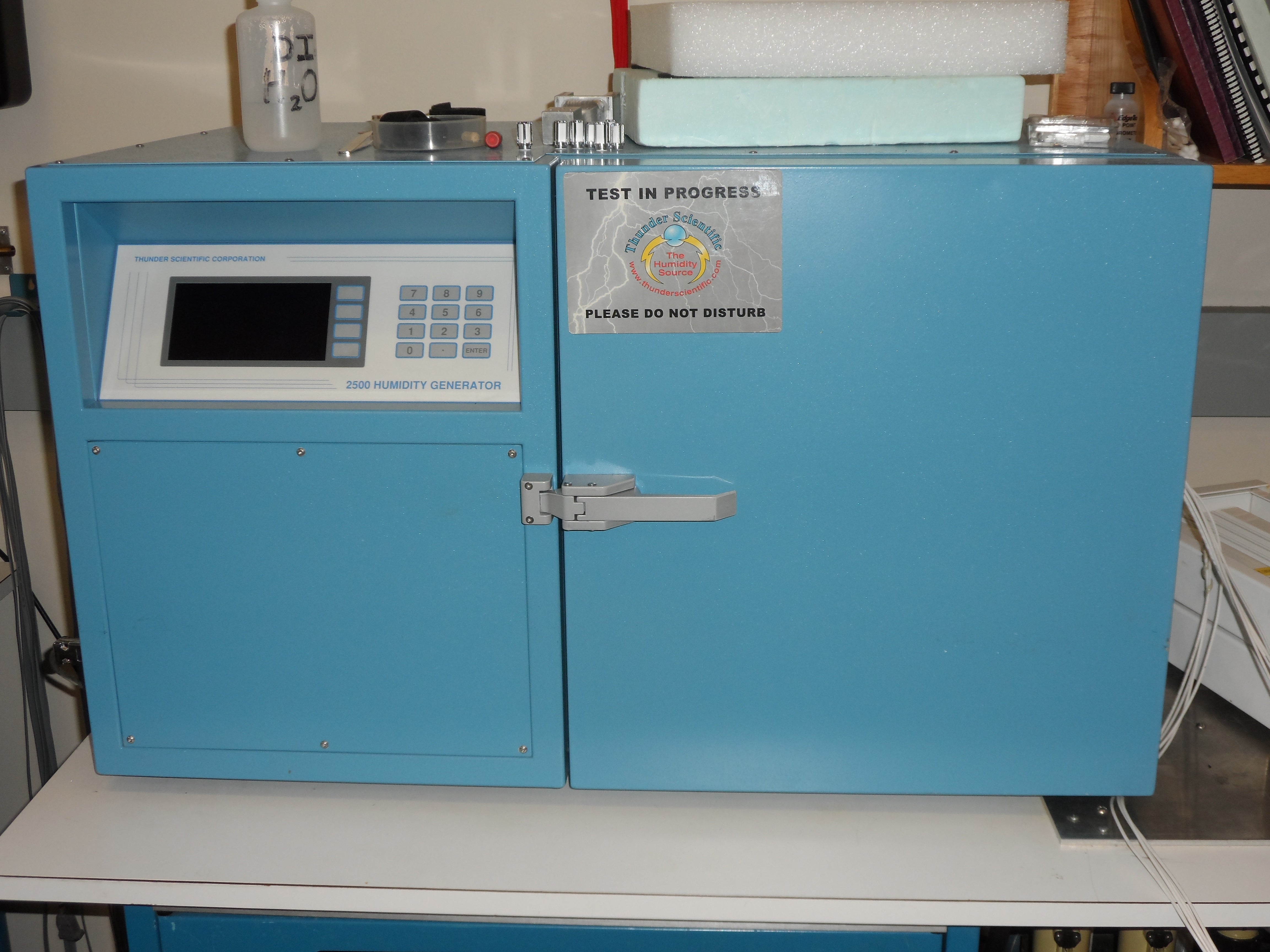
The calibration lab has a Thunder Scientific model 2900 Humidity Generator. The generator operation is based on Dalton's Law of Partial Pressure. The generator uses a two-pressure method where 100% saturated air at a high pressure flows through an expansion valve to the ambient pressure. If the gas temperature is held constant from saturated pressure to ambient, the humidity is a ratio of the chamber pressure to saturation pressure times 100. To achieve accurate measurements the temperature must be monitored from the high-pressure state to the ambient state. In addition to controlling humidity, the chamber can control the temperature of the air and the flow rate into the test area.
| Humidity range | 10% to 95% |
| Humidity accuracy | +0.5% |
| Humidity resolution | 0.02% |
| Temperature range | -18°C to 50°C |
| Temperature accuracy | +0.1°C |
| Temperature resolution | +0.027°C |
| Gas flow range | 10 to 50 l/m |
| Gas flow accuracy | +2% FS |
| Gas flow resolution | 0.05 l/m |
| Working area | 30.48 cm (W) x 30.48 cm (H) x 25.4 cm (D) |
Temperature Oil Baths
The laboratory maintains two temperature oil bath systems, FLUKE (Hart Scientific) 7040 and 7061. 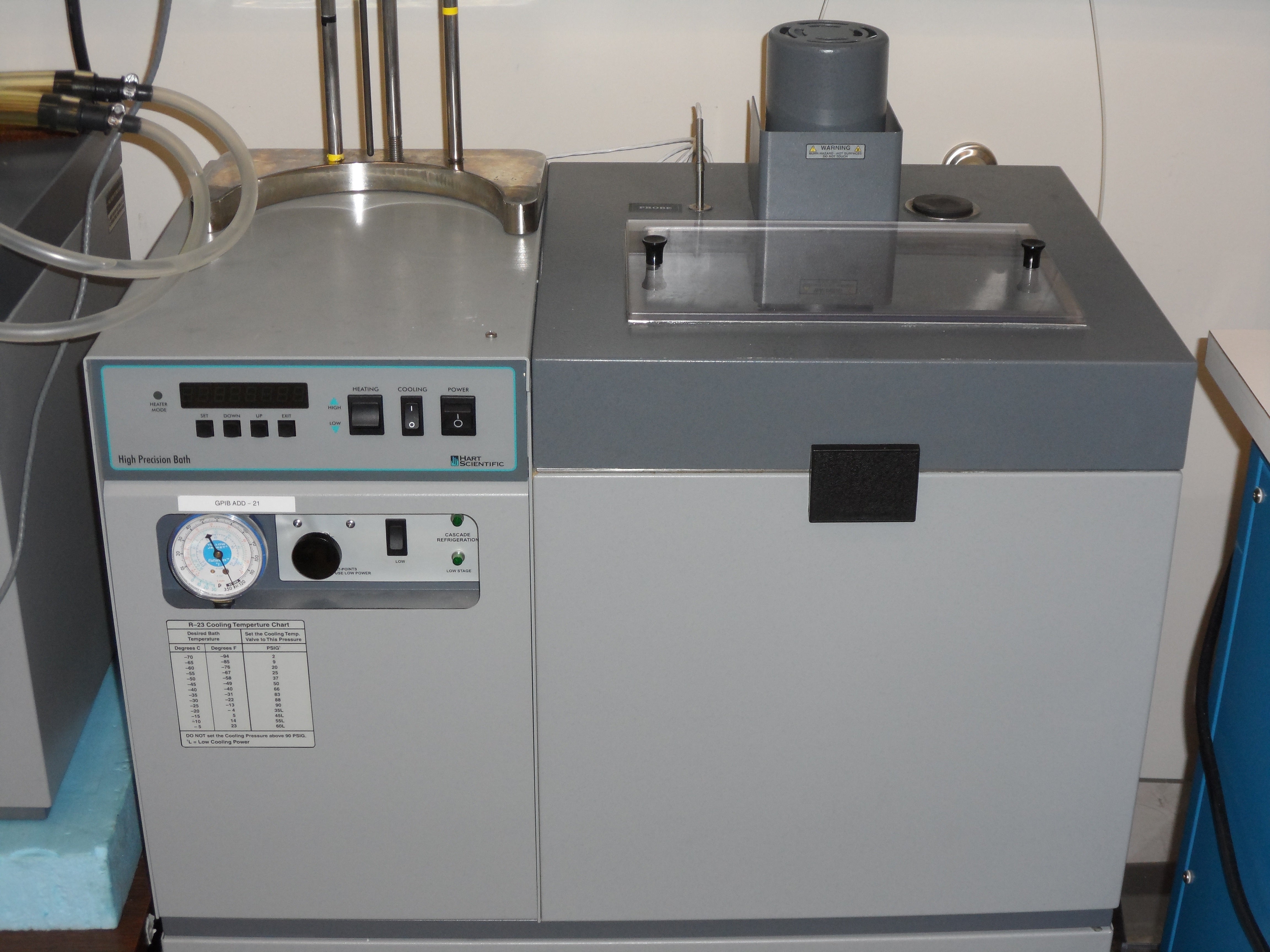 The design of the baths produces stabilities better than +0.003°C. A silicone oil is used as the bath fluid which provides a wide operating temperature range. Each bath has its own temperature reference probe which can be used as a reference. However, for best accuracy, the SPRT with the Super Thermometer Bridge should be used.
The design of the baths produces stabilities better than +0.003°C. A silicone oil is used as the bath fluid which provides a wide operating temperature range. Each bath has its own temperature reference probe which can be used as a reference. However, for best accuracy, the SPRT with the Super Thermometer Bridge should be used.
7040 Specifications
| Temperature range | -40°C to 110°C |
| Set-point accuracy | +0.5°C (bath reference probe) |
| Set-point resolution | +0.01°C (bath reference probe) |
| Typical bath stability | +0.0005°C |
| Working area | 28 cm x 28 cm x 28 cm |
7060 Specifications
| Temperature range | -60°C to 110°C |
| Set-point accuracy | +0.5°C (bath reference probe) |
| Set-point resolution | +0.01°>C (bath reference probe) |
| Typical bath stability | +0.002°C |
| Working area | 33 cm x 33 cm x 33 cm |
